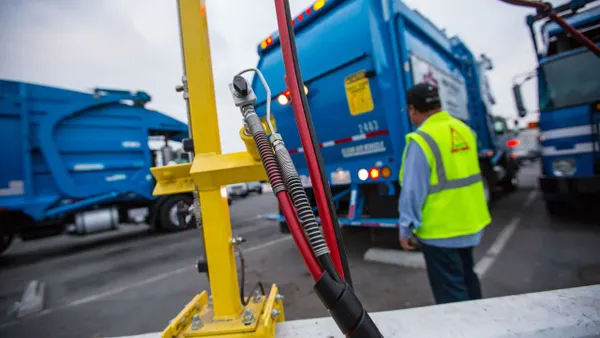Dive Brief:
- The East of England Co-Op will begin selling food that has reached its "best by" date at a price of just 10 pence (about 13 cents), as reported by The Guardian. The pricing will apply only to non-perishable goods such as rice, pastas and chips.
- The items will be taken off the shelves once they're one month beyond their "best by" date, as reported by NPR.
- In a 14-store trial, items that were marked down sold out within hours of having their prices cut. The store is also offering a "Guide to Dating," including helpful phrases such as "Don't be a binner, have it for dinner!" and "It's not nice to get dumped."
Dive Insight:
This is just one effort out of the U.K. to cut down on food waste, with newly-introduced, graphic food labels being another recent example. And while East of England may be the largest commercial example of a grocery chain pushing food that others might consider unsellable, it's not alone — in the U.S., there are examples of independent grocery stores selling food that is beyond its "best by" date or misshapen so that the food doesn't go to waste.
Given that many adults in the U.S. have been confused by date labels and a recent report that showed a majority of food that's trashed in cities across the country is edible, reform in this field could be a critical step in cutting down on food that is wasted. There has been some progress — like California signing a law to clarify date labeling and the Consumer Goods Forum approving a plan to standardize date labels by 2020. Like any big changes, these efforts will require time and plenty of consumer buy-in to be effective.
Reducing the amount of food that goes to waste is the most preferable option in the food waste recovery hierarchy, and enough source reduction could, in theory, eliminate the need for organics collection. In the mean time, the waste industry can respond by thinking about how best to process food waste. While the discussion between composting and anaerobic digestion will likely continue for some time, many agree that segregating organic waste from MSW should be common practice. Cities as from Austin and New York to Boise, ID are working to expand curbside organics collection. The success or failure of these cities could serve as case studies for other local governments looking to offer the service.









